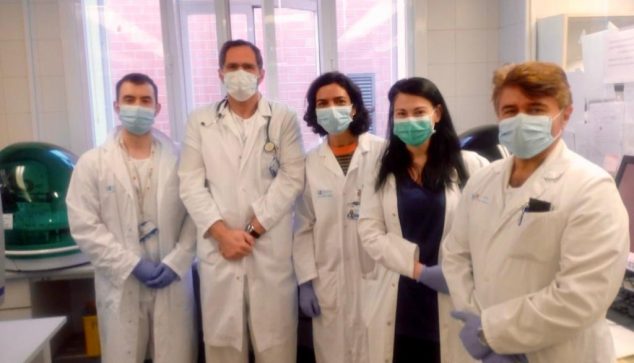Aware of the decisive importance of research to advance in the cure of diseases, the CRIS foundation against cancer, raises its commitment against this coronavirus pandemic by funding a promising research project that will also have a direct impact on cancer patients. In addition, it has been created a web platform to receive donations and promote this new line against COVID-19. A new and important step forward after supporting two clinical trials against Coronavirus at Hospital 12 de Octubre and temporarily releasing at Hospital Clínico San Carlos Office the space, where he will build a new CRIS Unit for Experimental Therapies.
The San Carlos Clinical Hospital has launched an ambitious multidisciplinary project led by Dr. Silvia Sánchez Ramón, from the Immunology service, with a budget of € 150.000, in which the CRIS Unit for New Experimental Therapies, actively led by Dr. Alberto Ocaña and Dr. Pedro Pérez Segura. The overall objective is to analyze in extremely high detail the immune response of patients with primary and secondary immunodeficiencies when infected with the SARS-CoV-2 coronavirus. Among them, patients without previous pathologies, but due to the course of their disease, it is suspected that they may have primary immunodeficiencies that have not been diagnosed; patients with diagnosed immunodeficiencies; and secondary immunodeficiencies, especially cancer patients.
The importance of the immune system seems decisive in the development of this disease, which can end the patient's life in a very short time due to lung problems. Among the patients at highest risk we find those who have a weak immune system, who have a special predisposition to contract severe forms of COVID-19.
Thus, the different components of the immune system of patients when infected with this virus will be analyzed at the cellular and genetic level, relationships between certain alterations in the immune system and how patients evolve will be sought, and markers will be identified that allow predicting when the patients how will their evolution be to anticipate and seek solutions.
Although cancer patients appear to be at higher risk, data on the behavior of the virus in these patients and how their immune systems work are still very limited. For this reason, it is extremely important to determine exactly what is happening and failing in these especially vulnerable patients in order to find the most effective ways to combat it.
Dr. Silvia Sánchez Ramón points out: “In more than 80% of patients, the disease is symptomless or very mild, which shows that the immune system is essential to stop the virus. In patients arriving at the hospital, it is important to determine immunological biomarkers to determine the risk they present of the disease having a severe course (respiratory distress, need for intubation)". And adds: "In this project we will look for productive immunological markers of severity of Covid-19 in cancer patients, in immunodeficient patients and in young people without risk factors that have a severe course, in which we assume that there is an unknown immunodeficiency", and concluding: "The Immunodeficient patients, including cancer patients, are a risk group against the SARS-CoV-2 coronavirus. There are very few studies that describe the immunological markers of severity and there are no data on immunological risk markers. However, it is necessary to study the immunological component that is associated with a worse prognosis, because in this way we will be able to identify early the patients who will have a worse evolution and treat early, as well as to develop new therapeutic strategies more aligned with the pathology ”.
Dr. Alberto Ocaña highlights the importance of this project. “I believe this study is important because it will allow the identification of molecular and cellular immunological mechanisms that will determine which patients are more susceptible to having an aggressive COVID19 infection and an inadequate immune response. In the case of cancer patients, it is of greater importance, since it supposes a population more vulnerable to any infection and with an immune system altered by their disease ".
The health emergency situation due to the coronavirus requires the urgent development of new therapeutic strategies to contain the pandemic. “The solution to end this disease, as it happens with cancer, is through research. At CRIS we know well the importance of financing cancer research projects in children and adults and we trust that with this help we can be more effective since it also attacks many of our patients. Despite these difficult times, at CRIS against cancer we have not stopped promoting cancer research, we have world-class researchers and we believe that together we will end this pandemic ”, explains Marta Cardona, director of CRIS against cancer.







